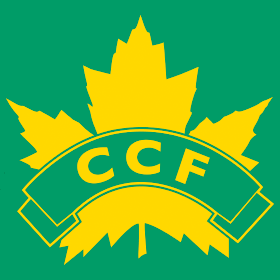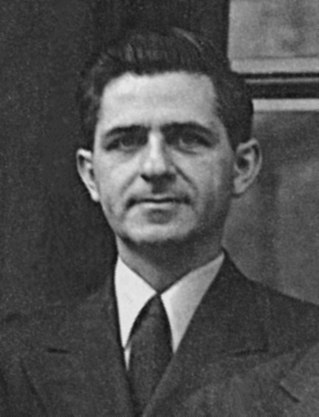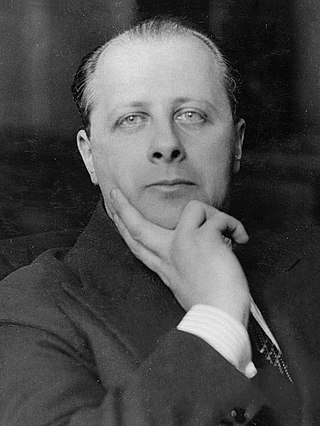Related Research Articles

The Co-operative Commonwealth Federation was a federal democratic socialist and social-democratic political party in Canada. The CCF was founded in 1932 in Calgary, Alberta, by a number of socialist, agrarian, co-operative, and labour groups, and the League for Social Reconstruction. In 1944, the CCF formed one of the first social-democratic governments in North America when it was elected to form the provincial government in Saskatchewan.

The Communist Party of Canada is a federal political party in Canada. Founded in 1921 under conditions of illegality, it is the second oldest active political party in Canada, after the Liberal Party of Canada. Although it does not currently have any parliamentary representation, the party's candidates have previously been elected to the House of Commons, the Ontario legislature, the Manitoba legislature, and various municipal governments across the country.

David Lewis was a Canadian labour lawyer and social democratic politician. He was national secretary of the Co-operative Commonwealth Federation (CCF) from 1936 to 1950 and one of the key architects of the New Democratic Party (NDP) in 1961. In 1962, he was elected as the Member of Parliament (MP), in the House of Commons of Canada, for the York South electoral district. While an MP, he was elected the NDP's national leader and served from 1971 until 1975. After his defeat in the 1974 federal election, he stepped down as leader and retired from politics. He spent his last years as a university professor at Carleton University, and as a travel correspondent for the Toronto Star. In retirement, he was named to the Order of Canada for his political service. After suffering from cancer for a long time, he died in Ottawa in 1981.

The National Unity Party of Canada (NUPC) was a Canadian far-right political party which based its ideology on Adolf Hitler's Nazism and Benito Mussolini's fascism. It was founded as the Parti national social chrétien du Canada (PNSC) by Nazi sympathizer Adrien Arcand on February 22, 1934. The party's activities were originally limited to Quebec, but it later expanded to Ontario and Western Canada. Party membership swelled in the mid-to-late 1930s as the party absorbed smaller fascist groups across the country. Following the outbreak of World War II, the Canadian government banned the NUPC on May 30, 1940, under the Defence of Canada Regulations of the War Measures Act. Arcand and many of his followers were consequently arrested and interned for the duration of the war.
The Canadian Union of Fascists was a fascist political party based in the city of Toronto in the 1930s with its western Canadian office in Regina, Saskatchewan.
Alexander Albert MacLeod was a political organizer and a prominent member of the Communist Party of Canada and, later, of its legal group, the Labor-Progressive Party. He was an elected Member of Provincial Parliament in Ontario (1943–51).

The Young Communist League of Canada (YCL-LJC) is a Canadian Marxist–Leninist youth organization founded in 1922. The organization is ideologically aligned with, but organizationally independent from, the Communist Party of Canada. The organization's members played a leading role in the On-to-Ottawa Trek and made up a significant portion of the Mackenzie–Papineau Battalion, which fought on the Republican side in the Spanish Civil War.
The United Socialist Movement (USM) was an anarcho-communist political organisation based in Glasgow. Founded in 1934 after splitting from the Anti-Parliamentary Communist Federation, the USM initially aimed to unite revolutionary socialists into an anti-fascist alliance and played a role in the early discussions on the founding of a "Fourth International". During the Spanish Civil War, it shifted its policies away from unconditional anti-fascism towards a revolutionary anti-militarism, which going into World War II led the USM into attempting to form a "Socialist-Pacifist alliance" and even collaborating with some reactionary elements in their opposition to the war. After the war, left with only a small old guard of anarchists and anti-parliamentarists, the USM again shifted its focus towards abstentionism, running unsuccessfully in a number of elections before its eventual dissolution in 1965.

Carlo Alberto Rosselli was an Italian political leader, journalist, historian, philosopher and anti-fascist activist, first in Italy and then abroad. He developed a theory of reformist, non-Marxist socialism inspired by the British Labour movement that he described as "liberal socialism". Rosselli founded the anti-fascist militant movement Giustizia e Libertà. Rosselli personally took part in combat in the Spanish Civil War, where he served on the Republican side.

Socialism in Canada has a long history and along with conservatism and liberalism is a political force in Canada.
The League of American Writers was an association of American novelists, playwrights, poets, journalists, and literary critics launched by the Communist Party USA (CPUSA) in 1935. The group included Communist Party members, and so-called "fellow travelers" who closely followed the Communist Party's political line without being formal party members, as well as individuals sympathetic to specific policies being advocated by the organization.
The American Artists' Congress (AAC) was an organization founded in February 1936 as part of the popular front of the Communist Party USA as a vehicle for uniting graphic artists in projects helping to combat the spread of fascism. During World War II the organization was merged into the Artists' Council for Victory, which effectively spelled the end of the organization.
Fascism has a long history in North America, with the earliest movements appearing shortly after the rise of fascism in Europe. Fascist movements in North America never gained power, unlike their counterparts in Europe.
The Defence of Canada Regulations were a set of emergency measures implemented under the War Measures Act on 3 September 1939, a week before Canada's entry into World War II.

Anti-fascism is a political movement in opposition to fascist ideologies, groups and individuals. Beginning in European countries in the 1920s, it was at its most significant shortly before and during World War II, where the Axis powers were opposed by many countries forming the Allies of World War II and dozens of resistance movements worldwide. Anti-fascism has been an element of movements across the political spectrum and holding many different political positions such as anarchism, communism, pacifism, republicanism, social democracy, socialism and syndicalism as well as centrist, conservative, liberal and nationalist viewpoints.
The World Committee Against War and Fascism was an international organization sponsored by the Communist International, that was active in the struggle against Fascism in the 1930s. During this period Adolf Hitler came to power in Germany, Italy invaded Ethiopia and the Spanish Civil War broke out. Although some of the women involved were Communists whose priority was preventing attacks on the Soviet Union, many prominent pacifists with different ideologies were members or supporters of the committee. The World Committee sponsored subcommittees for Women and Students, and national committees in countries that included Spain, Britain, Mexico and Argentina. The Women's branches were particularly active and included feminist leaders such as Gabrielle Duchêne of France, Sylvia Pankhurst of Britain and Dolores Ibárruri of Spain.

The Kingdom of Italy was governed by the National Fascist Party from 1922 to 1943 with Benito Mussolini as prime minister and dictator. The Italian Fascists imposed totalitarian rule and crushed political opposition, while promoting economic modernization, traditional social values and a rapprochement with the Roman Catholic Church.
William Krehm was a Canadian author, journalist, political activist and real estate developer. He was a prominent Trotskyist activist in the 1930s and went to Spain where he participated in the Spanish Civil War. In the 1980s he co-founded the Committee on Monetary and Economic Reform (COMER) and continued as the group's principal leader until his death in April 2019 at the age of 105.
The Canadian Nationalist Party was a fascist antisemitic party founded in Winnipeg, Manitoba by William Whittaker, a British ex-soldier who had served with the British Army in India, and a dozen Anglo-Saxon war veterans, in September 1933. The party initially claimed it was for equality of all citizens, but Whittaker was soon condemning Jews in his speeches at public rallies and in the party's newspaper, The Canadian Nationalist, and its other propaganda, leading to opponents confronting him at his rallies and being violently removed, often by police. The organization was modelled on Nazi stormtroopers and would march through Winnipeg's streets wearing khaki shirts, light brown breeches, and riding boots. Whittaker's lieutenant, Harry Simkins, and other CNP members dissatisfied with Whittaker's leadership, left to form the British Empire Union of Fascists in 1934.
References
- ↑ Penner, Norman (1988). Canadian Communism: The Stalin Years and Beyond. Toronto: Methuen. pp. 134–135. ISBN 0-458-81310-9.
- 1 2 3 Avakumovic (1975), p. 128.
- 1 2 Avakumovic (1975), p. 129.
- ↑ Avakumovic, Ivan (1975). The Communist Party in Canada: a History. Toronto: McClelland and Stewart. p. 178. ISBN 0771009801 . Retrieved February 25, 2024.
- ↑ "The Alexander Albert MacLeod fonds". Archives of Ontario. Government of Ontario. Retrieved February 25, 2024.
- ↑ "Spain's Democracy Talks to Canada: Pamphlets and Tours During the Spanish Civil War | Canadian Cultural History About the Spanish Civil War".
- ↑ Martin, Stephen Henry (July 7, 2014). "Canadian radicals and the Spanish Republic". Briarpatch. Retrieved February 25, 2024.
- ↑ "Spain's Democracy Talks to Canada | Canadian Cultural History About the Spanish Civil War".
- ↑ Socknat, Thomas. "Conscientious Objectors in the Context of Canadian Peace Movements". Journal of Mennonite Studies. Retrieved February 25, 2024.
- ↑ Panneton, Daniel (February 26, 2021). "HISTORY BLACK HISTORY MONTH 'Forgotten native son': The Canadian who tried to raise an army for Ethiopia". TVO Today. TVOntario. Retrieved February 25, 2024.
- ↑ League Against War, Fascism, To Continue Under New Name, The Globe and Mail (1936-); Toronto, Ont.. 14 Aug 1937: 4. ProQuest 1351019997
- ↑ Schoots-McAlpine, Martin. "CLASS STRUGGLE, THE COMMUNIST PARTY, AND THE POPULAR FRONT IN CANADA, 1935-1939" (PDF). Marxist Internet Archive.
- ↑ Wentzell, Taylor (2023). "Scenes of Berlin: Fascism and Anti-Fascism in Toronto during the Summer of 1938". Canadian Jewish Studies / Études juives canadiennes. 35: 23–25. doi: 10.25071/1916-0925.40316 . Retrieved 2024-02-25.
- ↑ "Quits League Chairmanship", Toronto Daily Star, 23 August 1939.
- ↑ Canada Outlaws 16 Groups as Subversive: Membership Illegal Under Regulations; Conant Asks Teeth Red-Tinged Bodies Banned Along With 'Cultural' Societies FASCISTS ALSO Sees Move Helpful but Ineffective if Courts to Be Used WOULD INTERN Beamish, Roy. The Globe and Mail; Toronto, Ont.. 06 June 1940: 1 ProQuest 1356011217